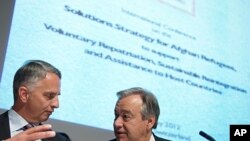An international conference in Geneva has agreed on a plan for the voluntary repatriation and reintegration of millions of Afghan refugees, of whom many have been living in exile for more than three decades. The multi-billion-dollar strategy lays out measures for creating favorable conditions for their return.
During the past 10 years, more than 5.7 million Afghan refugees have returned to Afghanistan. This is nearly one quarter of the Afghan population. In addition, almost two million refugees are still living in neighboring Pakistan and another one million in Iran, making this one of the largest and longest-lasting refugee situations in the world.
|
Afghanistan Solution Strategy
|
Participants at a U.N.-sponsored conference recognized the enormous economic and social costs shouldered by the host countries and, in the adoption of a strategic plan, they reaffirm the importance of the international community to share the burden and to assist the host communities.
Pakistan Minister of States and Frontier Regions Engineer Shaukat Ullah says he is pleased with the outcome of the conference. But, to make the strategy work, he says the final settlement that emerges as international forces draw down from Afghanistan in 2014 must include the Afghan refugee issue.
"The only solution to the Afghan refugee situation is their early and swift voluntary repatriation into their homeland," said Ullah. "The government of Pakistan's management and repatriation strategy envisions their return by December, 2012. The friends of Afghan people should redouble their effort and their early voluntary repatriation."
The Pakistani minister says the international community should step forward and share some of this burden by offering resettlement opportunities in more prosperous countries.
The Iranian Ambassador to the United Nations in Geneva agrees with his Pakistani colleague. Despite the economic and social drain on his country, he says Iran has generously provided skills training to hundreds of thousands of Afghan students, job opportunities to about 300,000 Afghan refugees, and has spent millions of dollars in medical care every year.
U.N. High Commissioner for Refugees Antonio Guterres says it is remarkable that the three countries - Afghanistan, Pakistan and Iran - were able to come together and present a joint solution to the Afghan refugee problem.
Although he believes the agreement will have a positive impact, he says the strategy does not replace a political solution.
"I think that it is absolutely essential that the international community works together with the national stakeholders and the regional stakeholders in order to make sure that an inclusive political solution is found for peace and security to be established in Afghanistan in a way that strongly enhances the return movement... It is also obvious that a concerted effort, an investment inside Afghanistan and 48 areas have been selected as area of high potential for return for that investment will also be able to enhance this movement," said Guterres.
Conference participants agreed to recognize the importance of providing livelihoods, education, shelter, and basic services to entice Afghan refugees to return home and to stay home.
They say, if they succeed in this, the efforts also should help to reduce the pressure on Afghans to leave the country in search of employment opportunities. The conference estimates it will cost nearly $2 billion to implement the plan for the next three years.




